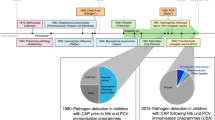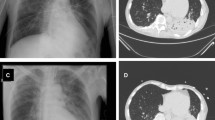Abstract
Background
Antibiotic use remains common for the treatment of lower respiratory tract infections. The objective of this study was to evaluate the impact of antibiotic use on the duration and severity of acute lower respiratory tract infection (LRTI).
Participants
Adult patients presenting to US primary or urgent care sites with a chief complaint of cough and symptoms consistent with LRTI.
Main Measures
Collected data included demographics, comorbidities, symptoms, and 48 viral and bacterial respiratory pathogens by PCR. Severity of signs/symptoms was reported for up to 28 days using diaries and text messages. Interpolation was used where data were missing.
Key Results
Of 718 patients with baseline data, 29% had an antibiotic prescribed at baseline. The most common antibiotics were amoxicillin-clavulanate, azithromycin, doxycycline, and amoxicillin in 85% of patients. Provision of an antibiotic had no effect on the duration or overall severity of cough, including in patients with viral, bacterial, and mixed infections. Receipt of an antibiotic did reduce the likelihood of a follow-up visit (14.1% vs 8.2%, aOR 0.47, 95% CI 0.26–0.84), perhaps by removing the motivation of getting an antibiotic at a follow-up visit. However, they were also more likely to receive a systemic corticosteroid (31.9% vs 4.5%, p < 0.001) and were also more likely to receive an albuterol inhaler (22.7% vs 7.6%, p < 0.001). Patients believed that receiving an antibiotic would reduce the duration of their illness by nearly 4 days.
Conclusions
In this large prospective study in the US primary and urgent care setting, antibiotics had no measurable impact on the severity or duration of cough due to acute LRTI. Patients had unrealistic expectations regarding the duration of LRTI and the effect of antibiotics which should be the target of antibiotic stewardship efforts.
Similar content being viewed by others
Data Availability:
Once our primary series of analyses are completed, data will be made available upon reasonable request for relevant collaborative research.
References
National Hospital Ambulatory Medical Care Survey: 2011 outpatient department summary tables. http://www.cdc.gov/nchs/data/ahcd/nhamcs_outpatient/2011_opd_web_tables.pdf. Accessed 28 Nov 2023
Fleming-Dutra KE, Hersh AL, Shapiro DJ, et al. Prevalence of Inappropriate Antibiotic Prescriptions Among US Ambulatory Care Visits, 2010-2011. JAMA. 2016;315(17):1864-1873. https://doi.org/10.1001/jama.2016.4151.
Linder JA, Stafford RS. Antibiotic treatment of adults with sore throat by community primary care physicians: a national survey, 1989-1999. JAMA. 2001;286(10):1181-1186.
Ebell MH, Radke T. Antibiotic use for viral acute respiratory tract infections remains common. Am J Manag Care. 2015;21(10):e567-575.
Malik SS, Mundra S. Increasing Consumption of Antibiotics during the COVID-19 Pandemic: Implications for Patient Health and Emerging Anti-Microbial Resistance. Antibiot Basel Switz. 2022;12(1):45. https://doi.org/10.3390/antibiotics12010045.
Turck D, Bernet JP, Marx J, et al. Incidence and risk factors of oral antibiotic-associated diarrhea in an outpatient pediatric population. J Pediatr Gastroenterol Nutr. 2003;37(1):22-26. https://doi.org/10.1097/00005176-200307000-00004.
Mitchell DK, Van R, Mason EH, Norris DM, Pickering LK. Prospective study of toxigenic Clostridium difficile in children given amoxicillin/clavulanate for otitis media. Pediatr Infect Dis J. 1996;15(6):514-519. https://doi.org/10.1097/00006454-199606000-00008.
McCarty JM, Phillips A, Wiisanen R. Comparative safety and efficacy of clarithromycin and amoxicillin/clavulanate in the treatment of acute otitis media in children. Pediatr Infect Dis J. 1993;12(12 Suppl 3):S122-127. https://doi.org/10.1097/00006454-199312003-00006.
Elstner CL, Lindsay AN, Book LS, Matsen JM. Lack of relationship of Clostridium difficile to antibiotic-associated diarrhea in children. Pediatr Infect Dis. 1983;2(5):364-366. https://doi.org/10.1097/00006454-198309000-00006.
McFarland LV. Epidemiology, risk factors and treatments for antibiotic-associated diarrhea. Dig Dis Basel Switz. 1998;16(5):292-307. https://doi.org/10.1159/000016879.
Beaugerie L, Flahault A, Barbut F, et al. Antibiotic-associated diarrhoea and Clostridium difficile in the community. Aliment Pharmacol Ther. 2003;17(7):905-912. https://doi.org/10.1046/j.1365-2036.2003.01531.x.
Young VB, Schmidt TM. Antibiotic-associated diarrhea accompanied by large-scale alterations in the composition of the fecal microbiota. J Clin Microbiol. 2004;42(3):1203-1206. https://doi.org/10.1128/JCM.42.3.1203-1206.2004.
Finkelstein JA, Davis RL, Dowell SF, et al. Reducing antibiotic use in children: a randomized trial in 12 practices. Pediatrics. 2001;108(1):1-7. https://doi.org/10.1542/peds.108.1.1.
Finkelstein JA, Metlay JP, Davis RL, Rifas-Shiman SL, Dowell SF, Platt R. Antimicrobial use in defined populations of infants and young children. Arch Pediatr Adolesc Med. 2000;154(4):395-400. https://doi.org/10.1001/archpedi.154.4.395.
Goldenberg JZ, Yap C, Lytvyn L, et al. Probiotics for the prevention of Clostridium difficile-associated diarrhea in adults and children. Cochrane Database Syst Rev. 2017;12(12):CD006095. https://doi.org/10.1002/14651858.CD006095.pub4.
Antimicrobial resistance. https://www.who.int/news-room/fact-sheets/detail/antimicrobial-resistance. Accessed 4 Dec 2023.
Antibiotic resistance threats in the United States, 2013. https://www.cdc.gov/drugresistance/pdf/ar-threats-2013-508.pdf. Accessed 4 Dec 2023.
Core Elements of Antibiotic Stewardship | Antibiotic Use | CDC. Published September 7, 2023. https://www.cdc.gov/antibiotic-use/core-elements/index.html. Accessed 4 Dec 2023.
Butler CC, Hood K, Verheij T, et al. Variation in antibiotic prescribing and its impact on recovery in patients with acute cough in primary care: prospective study in 13 countries. BMJ. 2009;338:b2242. https://doi.org/10.1136/bmj.b2242.
Little P, Rumsby K, Kelly J, et al. Information Leaflet and Antibiotic Prescribing Strategies for Acute Lower Respiratory Tract Infection: A Randomized Controlled Trial. JAMA. 2005; 293: 3029-35.
Hamm RM, Hicks RJ, Bemben DA. Antibiotics and respiratory infections: are patients more satisfied when expectations are met? J Fam Pract. 1996; 43: 56-62.
Ebell MH, Lundgren J, Youngpairoj S. How Long Does a Cough Last? Comparing Patients’ Expectations With Data From a Systematic Review of the Literature. Ann Fam Med. 2013; 11: 5-13.
Ebell MH, Radke T. Antibiotic use for viral acute respiratory tract infections remains common. J Managed Care. 2015; 21(10):e567-75.
Acknowledgements:
We would like to thank all the clinics who participated in enrollment and the patients who were kind enough to share their data.
Funding
This research was funded by the AHRQ Grant RO1 (grant number: R01HS025584).
Author information
Authors and Affiliations
Corresponding author
Ethics declarations
Conflict of Interest:
The authors declare that they do not have a conflict of interest.
Additional information
Publisher's Note
Springer Nature remains neutral with regard to jurisdictional claims in published maps and institutional affiliations.
This research has not been presented previously.
Supplementary Information
Below is the link to the electronic supplementary material.
Rights and permissions
Springer Nature or its licensor (e.g. a society or other partner) holds exclusive rights to this article under a publishing agreement with the author(s) or other rightsholder(s); author self-archiving of the accepted manuscript version of this article is solely governed by the terms of such publishing agreement and applicable law.
About this article
Cite this article
Merenstein, D.J., Barrett, B. & Ebell, M.H. Antibiotics Not Associated with Shorter Duration or Reduced Severity of Acute Lower Respiratory Tract Infection. J GEN INTERN MED (2024). https://doi.org/10.1007/s11606-024-08758-y
Received:
Accepted:
Published:
DOI: https://doi.org/10.1007/s11606-024-08758-y




